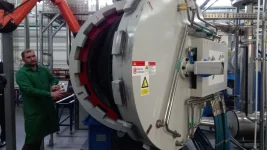A St. Petersburg company started making special metal-cutting parts for machines. These parts help make equipment for planes, ships, nuclear plants, and engines. The Virial factory operates around the clock in Sestroretsk at Voskov Technopark. The company spent 1.25 billion rubles to create this new production line. Their parts work with computer-controlled machines that need precision tools.
These hard metal alloys cut through steel better than other materials because they contain tungsten carbide. The material stays sharp longer when cutting through even the toughest metals. Only two other Russian factories make similar products - one in Kirovograd and another called Skif-M in Belgorod. Foreign companies stopped selling these parts to Russia recently. The factory creates its parts from Russian powders mixed into special recipes.
The government helped Virial grow with a one billion ruble loan from the Industrial Development Fund. The company bought about 50 new machines with this money. Scientists from the Russian Academy helped design products that match foreign quality. The factory wants to expand but struggles to find enough workers. They hire from five technical schools and two universities in St. Petersburg.
Foreign companies still control most of the Russian market for these cutting tools. Chinese and South Korean manufacturers sell about 70 percent of all parts used in Russia. Virial hopes to increase its market share from 2 percent to 10 percent for replaceable plates. They also want to grow from 10 percent to 40 percent for tool blanks. This growth would reduce how many of parts Russia needs to import from other countries.
These hard metal alloys cut through steel better than other materials because they contain tungsten carbide. The material stays sharp longer when cutting through even the toughest metals. Only two other Russian factories make similar products - one in Kirovograd and another called Skif-M in Belgorod. Foreign companies stopped selling these parts to Russia recently. The factory creates its parts from Russian powders mixed into special recipes.
The government helped Virial grow with a one billion ruble loan from the Industrial Development Fund. The company bought about 50 new machines with this money. Scientists from the Russian Academy helped design products that match foreign quality. The factory wants to expand but struggles to find enough workers. They hire from five technical schools and two universities in St. Petersburg.
Foreign companies still control most of the Russian market for these cutting tools. Chinese and South Korean manufacturers sell about 70 percent of all parts used in Russia. Virial hopes to increase its market share from 2 percent to 10 percent for replaceable plates. They also want to grow from 10 percent to 40 percent for tool blanks. This growth would reduce how many of parts Russia needs to import from other countries.












